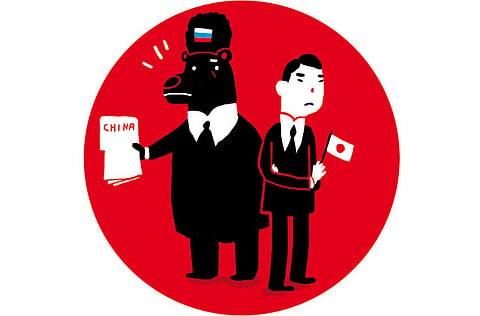Russia shouldn't miss this opportunity
Putin's record would allow him to reach an agreement that restores Japan's sovereignty over its Northern Territories

The recent smooth exchange of spies between Russia and the United States appears to demonstrate that the "reset" in relations between the two countries has worked. But Russia has so far done little to "reset" its relations with Japan.
That is not only a lost opportunity, given Russia's need to modernise its economy, but a grave strategic error in view of Russia's increasing worries about China's ambitions in Asia, which includes Russia's lightly populated Siberian provinces.
In April, China's navy carried out military exercises near Japan, and its Fleet No 91756, recognised as one of its finest, conducted a live-fire exercise in the East China Sea off the coast of Zhejiang province, including missile-interception training with new vessels.
China's objectives appear to have been to enhance its navy's operational capacity, particularly in terms of jamming and electronic warfare, and to test its joint capabilities with the Chinese air force.
Perhaps more importantly, the Chinese seem to have intended to send a warning signal to US and South Korean naval forces as their joint manoeuvres in the Yellow Sea approach. But the Chinese also sent a powerful signal to Japan and Russia.
Japan's government should, of course, be keeping a close eye on China's military. Instead, the current Japanese administration plans to send the ex-chairman of a trading conglomerate as its ambassador to China — that is, a man whose interests in China may be commercial rather than national security.
Meanwhile, Russia is only now beginning to realise that it must be pro-active in protecting its national-security interests in the Pacific region. The problem is that Russia's focus is wrong-headed.
For coinciding with China's naval exercises in the Yellow Sea, the Russian Armed Forces carried out part of its "Vostok 2010" drills (involving 1,500 troops) on Etorofu, the largest island among the Russian-occupied Northern Territories of Japan. The entire Vostok 2010 exercise involved more than 20,000 troops.
Russia's illegal occupation of these islands began on August 18, 1945, three days after Japan accepted the Potsdam Declaration (or the Proclamation Defining Terms for Japanese Surrender), which ended the Pacific War.
Stalin's Red Army nonetheless invaded the Chishima Islands, and has occupied them, Southern Karafuto (or Southern Sakhalin), and the islands of Etorofu, Kunashiri, Shikotan, and Habomai — which had never been part of the Russian Empire or the Soviet Union at any point in history — ever since.
Contentious decision
Indeed, the lower house of Russia's Duma recently passed a resolution designating September 2 as the anniversary of the "real" end of the Second World War, effectively making it a day to commemorate the Soviet Union's victory over Japan — and thus an attempt to undermine Japan's claim that the occupation of the islands came after the war's end.
On a recent trip to Russia's Asian port of Vladivostok, Russian President Dmitry Medvedev declared that the social and economic development of Russia's Far East is a national priority. By continuing to maintain its illegal occupation of Japanese territory, however, Russia precludes expansive Japanese involvement in this effort, effectively leaving the Chinese to dominate the region's development.
Russia's persistence in its self-defeating occupation is surprising. Indeed, when Boris Yeltsin was Russia's president, the country came close to recognising the need to return the Northern Territories to Japan. But a nationalist backlash doomed Yeltsin's efforts.
Japanese public opinion has remained adamant for decades that all four islands belong to Japan, and that no real peace can exist until they are returned. So sending Yukio Hatoyama as ambassador may elicit harsh criticism, as his grandfather once agreed to a peace process that returned only two islands, and many Japanese fear that his grandson may also be prepared to cut another unequal deal.
Russia should recognise that it has neglected its position in Asia for too long, and that only when it returns Japan's Northern Territories can Japanese expertise be brought seriously to bear in developing Russia's Far East.
Only normal bilateral relations will allow the two countries to work together to forge a lasting Asian balance of power. Given his record, Vladimir Putin would not face the type of nationalist backlash Yeltsin confronted if he sought to reach an agreement that restored Japan's sovereignty over its Northern Territories. Will he have the strategic vision to do so?
Yuriko Koike, a former Japanese minister of defence and national security adviser, is a member of the opposition in Japan's Diet.



